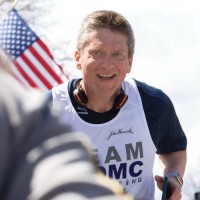Even though uncertainty can be frightening, you have the power to change your mind — and the rest will follow.
Before Mike Quaglia was diagnosed with YOPD, he was hard at work making a name for himself in sales. After leaving the family business for a new position, he quickly rose through the ranks to achieve the title of #1 salesperson and was later promoted to manager.
He excelled in connecting with clients and enjoyed maintaining relationships with them. In fact, his interpersonal talents and people skills played a big role in his career success. Hosting golfing trips and treating clients to dinner was arguably his favorite part of the job. Mike had his sights set on running the whole company if things kept going his way.
But they didn’t. And if they had, then he wouldn’t have this story to share.
In October of 2006 at age 42, Mike found out that he had Young Onset Parkinson’s Disease. Determined not to let it get in the way of his plan to become CEO, he pushed himself to continue on like nothing happened. That worked out for a while, but as time went on, symptoms began to pop up and interfere with his performance.
“It was like Parkinson’s kicked my brain,” he recalls. “It was all mental; I didn’t experience any of the physical symptoms back then. I just became more paranoid, depressed, and apathetic. I stopped communicating with everyone.”
Mike began to jump between jobs every couple of years, which he’d never done before. He withdrew from friends and family and watched the connections he worked so hard to cultivate crumble bit by bit.
But it’s not that he suddenly and randomly decided not to care anymore — it’s that he was grappling with the mental and emotional implications of a disease over which he had no control.
“I went from being really communicative to basically falling off the face of the Earth,” he remembers. “I hit the bottom around 2016 or 2017. But even though I had stopped talking to her the way I used to, my wife supported me through the whole ordeal. And I also have some really great friends and business partners that stuck by me, and who I still talk to to this day.”
With the support of his wife and friends behind him, Mike was ready to take some small steps toward positive change. The first was a conversation with fellow YOPD patient Heather Kennedy about separating thoughts from the self.
“We talked about how to become more aware of our thoughts, understand they’re not part of ourselves, and let them go,” he said. “I knew that before, but talking to her just really solidified that concept for me.”
Following that conversation, Mike’s curiosity about the relationship between thoughts and feelings prompted him to give therapy a try.
“I went through three therapists before I found one I couldn’t BS,” he chuckled. “He helped me organize my thoughts and change my perspective. He also helped me understand how my brain is just reacting to things that happened in the past, and how to use that to stop worrying so much about the future.”
Not long after, small steps turned into bigger steps.
Mike began to open back up to his wife again, which led to the couple training for and running the Boston Marathon together in 2019. Not only did it set the tone for a more physically healthy lifestyle, but training also gave them the chance to spend more quality time together.
And while he didn’t return to his pre-diagnosis career in sales, Mike reignited his passion for connection and meeting new people through hosting podcasts. In fact, you can listen to him and his team interview guests about various topics relating to YOPD on the YOPN Living Well Starts HereSM podcast.
Mike’s experience serves as a hopeful reminder to the recently diagnosed that it’s always possible to find joy and fulfillment — even when your life takes an unexpected turn. When asked to sum up what he’s learned to share with fellow YOPD’ers, his advice is:
1. Don’t shut yourself off from the people that love you.
2. Remember you’re still the same person.
3. Find your passion and go after it, regardless of whether or not it makes you money.
4. It’s okay to reorganize your mindset and your plans — the rest will follow.

